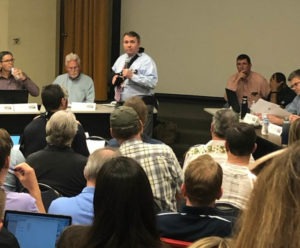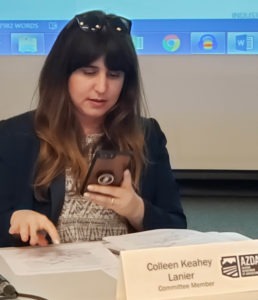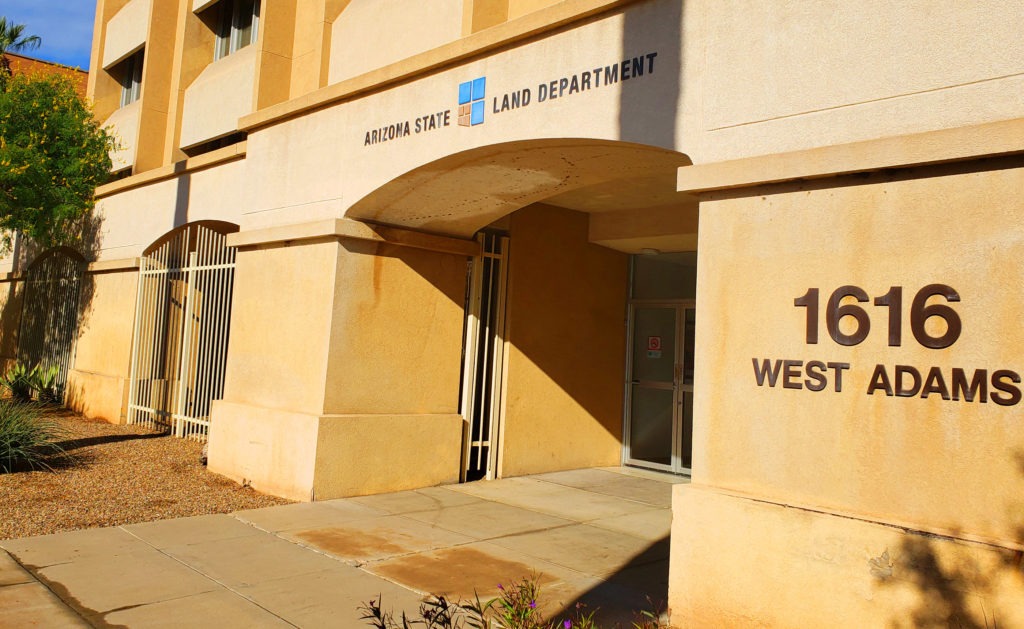BY MIKEL WEISSER
The March meeting of AZDA’s Industrial Hemp Program public hearings most definitely came in like a lion. This month’s three-hour extravaganza featured bad news, great news, and even had a celebrity speaker, Dept of Agriculture Director, Mark Killian.
The spacious ADOT auditorium where the group met last month was unavailable, so the event moved back to the Land Use Building in the Capitol Complex and was, though it seemed theoretically impossible, somehow even more crowded than before. Extra rows of chairs were added across the front and the back of the auditorium, but the room still could not accommodate the teeming crowd.
There were notably very few minorities in the room and only a few gray-haired people for that matter. The vast majority of the room was filled with farmers and would-be farmers under 40 that ranged from the short-haired farmer crowd who like Kid Rock because he’s country, all the way to the long-haired farmer crowd who like Kid Rock because he’s a rocker.
Speaker in the House

Director Killian kicked off the festivities by offering the crowd the thirty-thousand-foot view of the budding program. Unfortunately, now that the accelerated start date is getting nearer, the technical difficulties of launching such an ambitious program are beginning to come into focus. “Don’t get your tractors going just yet,” Killian warned.
Though the program is set to officially begin June 1st, the dept. expects the application process to take several days and the DPS fingerprint process can take as much as six weeks. Killian suggests a more realistic planting day might be early July. Though on a brighter note, as the program is coming into focus, it’s possible that AZDA will be able to lower the cultivation fees if the number of projected applicants continues to rise.
Make no mistake, aside from acknowledging problems with the logistics, Director Mark Killian is very much in favor of the state’s new hemp program. Prior to passage of the 2018 Farm Bill and the passage of AZ’s own hemp bill, almost 80,000 acres of hemp was already in production somewhere else in the US. With federal hemp legalization, and CBD products now being sold in Walgreens and CVS, the American hemp market is about to explode. Thanks to our year-round growing season offering potentially three harvests a year, AZ is primed to become a major player.
The state already has a $23 billion-dollar ag industry, principally in alfalfa, pecans, and wheat, in addition to three of the state’s famous 5 Cs: cotton, citrus and cattle. Given the low-water needs, hardiness and adaptability of hemp, the crop could turn AZ deserts gold.
Killian concluded by reminding the farmers on hand that rural Arizona needs the economic development hemp can bring and the climate, soil and general environment should be fantastically well suited to growing hemp, “So, let’s grow a lot of hemp!” Killian called to cheers. “Let’s grow hemp over every country side!”
Following the director’s presentation, an officer from the Arizona Dept. of Public Safety (DPS) was on hand to explain the fingerprinting process. All hemp cultivation applications must be received with a valid level one fingerprint card. Even though hemp is now federally legal, the FBI insists that background checks are required to handle hemp. The Ag Dept. won’t be accepting applications until June 1st.
Most felony offenses that would disqualify a person can be resolved after 5yrs, however sex offenses, even expunged ones, can lead to permanent disqualification. Those who already have level one DPS fingerprint cards should be covered, but lower level cards will have to be re-processed. Anyone with questions should also contact the DPS Fingerprint Card Office (602-223-2779) to be sure. The DPS fingerprint card application will cost $67 dollars.
Rules Package Advances
As promised the March meeting completed reviewing and revising the second half of the rules package. A reporting schedule was established. Farmers will need to report to the dept. fourteen days prior to harvest, 72 hours prior to transporting that harvest, 48 hours after major crop damages, 48 hours before planting and then within seven days after with crop info that included GPS coordinates.
Processors will have 72 hours to report receiving out-of-state hemp for processing. The same for nurseries receiving propagation materials. Committee member and Hemp Industries Association Director Colleen Lanier also called for phytosanitary certificates on all seed brought into the state and a “chain of custody” record to be maintained.

One of the bigger discussions of the February meeting returned to the agenda for the March hearing as the committee members debated the issue of research licensing. Originally the suggested language would have required limiting research licenses to labs attached to university programs.
Ever the lightning rod for controversy committee member Michael Stoltz recommended using the USDA grant application standards to prevent disreputable applicants from gaming the system. Last month, independent entrepreneurs, like Dr. Hope Jones, pushed the committee to reconsider.
This month that reconsideration took up the bulk of the discussion. In the end, the issue was left to be finalized at a later meeting, though the AZDA lawyer reminded the committee they would want to create the finalized language and not leave it up to the dept.
Starting the Genetics
A second major topic was establishing which seeds would be approved for use and what that approval process would involve. Finalized language for plant propagation materials, such as clones and tissue culture, was not included this month but will be back on the agenda next month and the seed question itself is far from settled.
The law is pretty specific as to what kinds of cannabis plants qualify as hemp. Only plants w a dry weight THC count of less than 0.3% will be allowed in AZ. All cannabis seeds look a lot alike however and, even with the US Farm Bill in place, law enforcement still worries about farmers trying to grow “marijuana” under the guise of hemp.
The problem is compounded by the fact that there are currently, “officially,” no legal hemp seeds or hemp seed brokers in AZ and the original language specified that the Arizona Crop Improvement Association (ACIA) was to be the official seed certification agency for the state. But there aren’t any seeds in-state for them to certify, so all of the first crop will be propagated with out-of-state seeds and clones and be certified by agencies in other states and even other countries.
Colleen Lanier called for fewer restrictions on seed stock and encouraged the committee to approve other certification sources beyond AOSCA. With no swear jar in sight, Michael Stoltz wholeheartedly agreed, “let’s not build some half-ass BS program,” he quipped.
While ACIA is a member of the national organization the Association of Official Seed Certifying Agencies (AOSCA), at least at first, hemp seed will have to come from other places. Stoltz, who has a background in hemp in Germany, expressed concern for the availability of qualified seeds. “You can’t start an industry with seeds that are so restricted they cost $1 per seed. You can’t plant an acre like that, much less start an industry. As far as I know, in the US there is only one company in Colorado that is meeting these standards, New West Genetics, and they’re already sold out.”
Committee co-chair Paco Allerton was quick to reassure the room that not only would any AOSCA recognized certification company be allowed to market hemp seed to AZ farmers, but the committee was determined to make sure AZ farmers would be able to afford to start their crops. “I don’t believe we intend to shut anyone out. It’s my intention to keep the process as open as possible so we can develop our own genetics.” When the room again burst out in applause, Allerton grinned, “I see we do have a fan club here.”

In Other News …
The biggest piece of good news was the decision to drop the restrictions on the types of processed hemp products that could be marketed. Readers may recall the original language discussed in the January meeting intended to prohibit marketing of smokable hemp, such as hemp cigarettes and loose or ground buds. Reasoning that any processed hemp would have been tested for THC content and legal according to federal law, the committee struck the prohibited product section entirely, except for restricting the sale of live plants.
Testing will be required for produced hemp, but not for processed products made from approved plants. During his remarks, Killian confirmed that 3rd party certified labs will be necessary to handle the volume of tests expected. Later the topic generated discussion about the storage of samples and their inevitable degradation.
In case of appeals for failed THC tests, samples will be kept for three months, then be destroyed. AZDA’s lawyer was quick to point out that the dept does not want to be responsible for collecting and storing “hot” samples. The price of THC testing was established at $150 per sample though the number of samples required per farm per acre is still being determined.
As usual, the best quote of the March hearing came, once again, from Michael Stoltz. In light of language in the US Farm Bill, which legalized hemp nationally, Stoltz asked the committee to drop the word “industrial” and just call the commodity “hemp.” Stoltz speculated the word “industrial” had simply been added to further differentiate the plant from marijuana. “I personally have no problem with marijuana,” Stoltz said soberly, “but it’s been holding back this crop for years.”
With only two months left to go till the start date, expect the April and May meetings to be action packed. Reminder that these rules are still in the draft stage and even after they’re finished, the Secretary of State’s office and the Dept of Agriculture’s administrative counsel will have to approve them.
You can learn more about the Arizona Dept. of Agriculture’s Hemp Program and request a draft copy the proposed rules by visiting the Dept of Ag Industrial Hemp Program webpage today.
—Mikel Weisser is the editor and chief staff writer for Arizona Cannabis Monthly and state director of AZ-NORML



